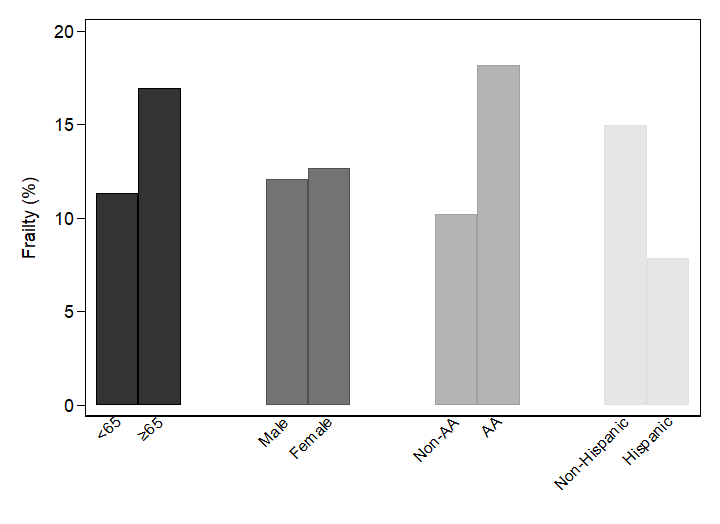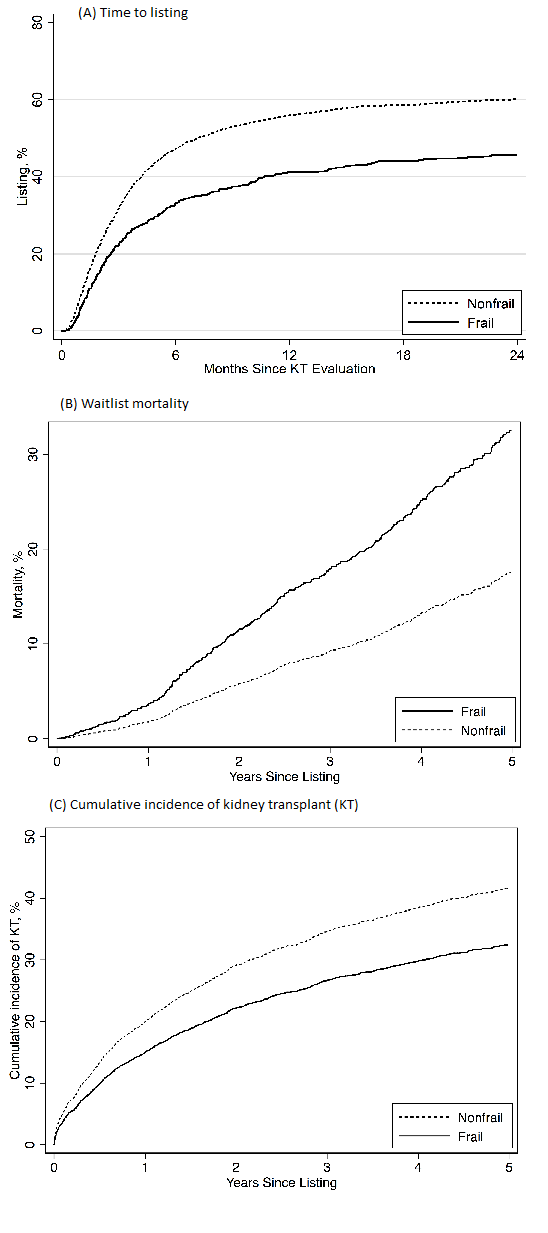Multicenter Cohort Study of Frailty and Access to Kidney Transplantation
1JHU, Baltimore, MD, 2MIchigan, Ann Arbor, MI, 3Methodist, San Antonio, TX
Meeting: 2019 American Transplant Congress
Abstract number: 507
Keywords: Age factors, Kidney transplantation
Session Information
Session Name: Concurrent Session: Non-Organ Specific: Disparities and Access to Healthcare I
Session Type: Concurrent Session
Date: Tuesday, June 4, 2019
Session Time: 2:30pm-4:00pm
 Presentation Time: 3:42pm-3:54pm
Presentation Time: 3:42pm-3:54pm
Location: Room 208
*Purpose: Frailty, a syndrome distinct from comorbidity and disability, is clinically manifested as a decreased resistance to stressors and is present in up to 35% of end-stage renal disease (ESRD) patients. It is associated with falls, hospitalizations, poor cognitive function, and mortality. Also, frailty is associated with poor post-kidney transplant (KT) outcomes including graft loss and mortality. It is likely frailty is associated with decreased access to KT, given its association with poor outcomes on dialysis and post-KT. Yet, clinicians have difficulty identifying which patients are frail; therefore, we sought to quantify if frail KT candidates had similar access to KT as nonfrail candidates.
*Methods: We studied 7,078 KT candidates (2009-2018) in a three-center prospective cohort study of frailty. Fried frailty (unintentional weight loss, grip strength, walking speed, exhaustion, and activity level) was measured at outpatient KT evaluation. We estimated time to listing and transplant rate by frailty status using Cox proportional hazards and Poisson regression, adjusting for demographic and health factors.
*Results: The mean age was 54 years (SD=13; range 18-89), 40.2% were female, 33.9% were African American, and 21.1% were frail. Frail participants were almost half as likely to be listed for KT (hazard ratio:0.62, 95%CI:0.56-0.69, p<0.001) compared to nonfrail participants, independent of age and other demographic factors. Furthermore, frail candidates were transplanted 35% less frequently than nonfrail candidates (incidence rate ratio:0.65, 95%CI:0.55-0.77, p<0.001).
*Conclusions: Frailty is associated with decreased listing and decreased rate of transplant and is a potentially modifiable risk factor. Thus, assessment at kidney transplant evaluation could improve patient counseling and motivate strategies to improve pre-KT outcomes for frail candidates of all ages.
To cite this abstract in AMA style:
Haugen C, Chu N, Ying H, Desai N, Norman S, Garonzik-Wang J, Bingaman A, Segev D, McAdams-DeMarco M. Multicenter Cohort Study of Frailty and Access to Kidney Transplantation [abstract]. Am J Transplant. 2019; 19 (suppl 3). https://atcmeetingabstracts.com/abstract/multicenter-cohort-study-of-frailty-and-access-to-kidney-transplantation/. Accessed February 28, 2026.« Back to 2019 American Transplant Congress


